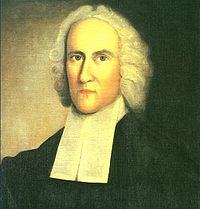The critical thing we must all learn in life is how to make sure that our lives match up to what we have learnt of God. What can we do to insure that the preaching we hear has the desired effect on us and leads to real change? How can we learn to not just be hearers of the Word, but doers also?

Watch Your Life and Doctrine Closely is the title of a chapter from a new book based on the
Together For the Gospel Conference. C. J. Mahaney’s practical advice seems all the more relevant in light of recent events. As a result, Crossway has kindly agreed to release the pdf. for
free download from Justin Taylor’s site. (Incidentally, I have decided not to comment on these events, although that is not in any way intended as a criticism of those who have.) C. J. is clear that, as well as getting our theology right and listening to sermons, we need to have friends in small groups to help us apply it.
As a preacher, I am also interested in what the desired effect of my sermons themselves should be. I have always had the feeling that there is much, much more going on than merely the transfer of a set of notes from in front of the preacher to the notebooks of the congregation, bypassing the brains and hearts of both. After all, if that were the task in hand, a photocopier would be a more efficient way of acheiving it.

Tim Challies, in
The Benefit Obtained By Preaching, quotes Jonathan Edwards, who said,
‘The main benefit that is obtained by preaching is by the impression made upon the mind in the time of it, and not by the effect that arises afterwards by a remembrance of what was delivered.’ This is a very, very striking statement which I suspect would be rather controversial today. It is coming out of Edwards’ very clear desire that preaching affects what he calls the “affections” as well as the intellect. For it to be true, it also has to be the case that there is a mysterious power associated with preaching – that the Holy Spirit is in some way active in applying His Word.
I have blogged about the “
power of preaching,” and also explored my own thinking about
the mechanics of how preaching works. I said something which certainly has some overlap with the Edwards quote – “I do believe with many that a form of preaching that simply attempts to impart knowledge rather than values does not hit the mark. I know that there is a beneficial “drip drip” effect of repeated good preaching that is additional to anyone being able to recall specific points that the preacher has made. Of course, preaching is useless unless it is heard correctly and responded to by the hearer – the really crucial thing is a transformed life, but ultimately how we live is determined by what we believe and value emotionally. The way to a changed behaviour set is through a changed cognitive set. So again, I say that since we are renewed by the transformation of our minds”
David Wayne also posted on the kind of preaching that might have the sort of impact Edwards seems to be looking for.
As I have previously quoted Wesley, we have to have the kind of preaching that changes hearts – whilst we cannot do it without the Spirit, there seems to be a certain kind of preaching that the Spirit uses.
Challies resonates with the view of the original Edwards quote and says:

“With the amount of conferences I attend and the number of books I read, I have had to have faith that God is working through them, even if I cannot remember the intimate details of a book or conference even only three short weeks after the fact. I’ve had to trust that the effort is not wasted, even if so much seems to fade away so quickly. I’ve had to trust that the Holy Spirit is at work behind the scenes, doing His work, even when I cannot easily measure any benefit. I’ve had to trust, and this has been a useful exercise to me.
The words of Edwards gave me confidence that the benefit of a book cannot be measured simply by how much I remember a week or two weeks or a month after reading it. The benefit of a sermon may be greater during the hearing of it than in the later reflections upon it. The benefit of a conference may be more in the hearing than in the recounting of it. God uses books, Bible studies, conferences, and sermons, not just to fill my mind, but also (and perhaps even primarily) to stir my affections, even if a frustrating amount of the benefit seems to fade away far too quickly.”
Challies also quotes MLJ’s response to this, which he found at
Expository Thoughts. Martyn Lloyd-Jones wrote of Edwards:
“The first and primary object of preaching is not only to give information. It is, as Edwards says, to produce an impression. It is the impression at the time that matters, even more than what you can remember subsequently . . . It is not primarily to impart information; and while you are writing your notes you may be missing something of the impact of the Spirit.”
In a different matter, but one related to the Holy Spirit’s work in our lives, in an article entitled A Neuroscientific Look at Speaking in Tongues, The New York Times is covering the research I linked to previously about tongues-speaking and the brain. I would be interested to see if anyone has a link to the second research they showed, which seemed to suggest that tongues may have positive mental health benefits. I could not find it myself.















